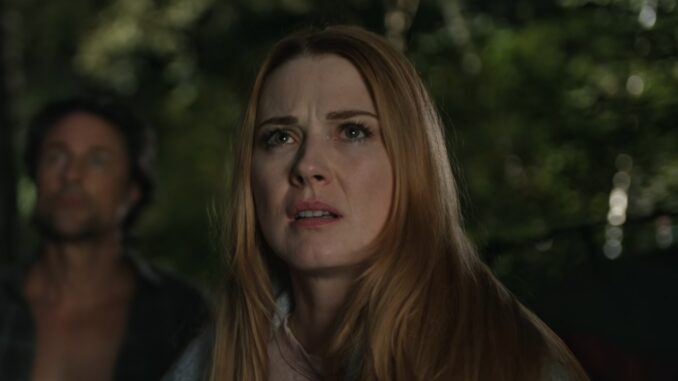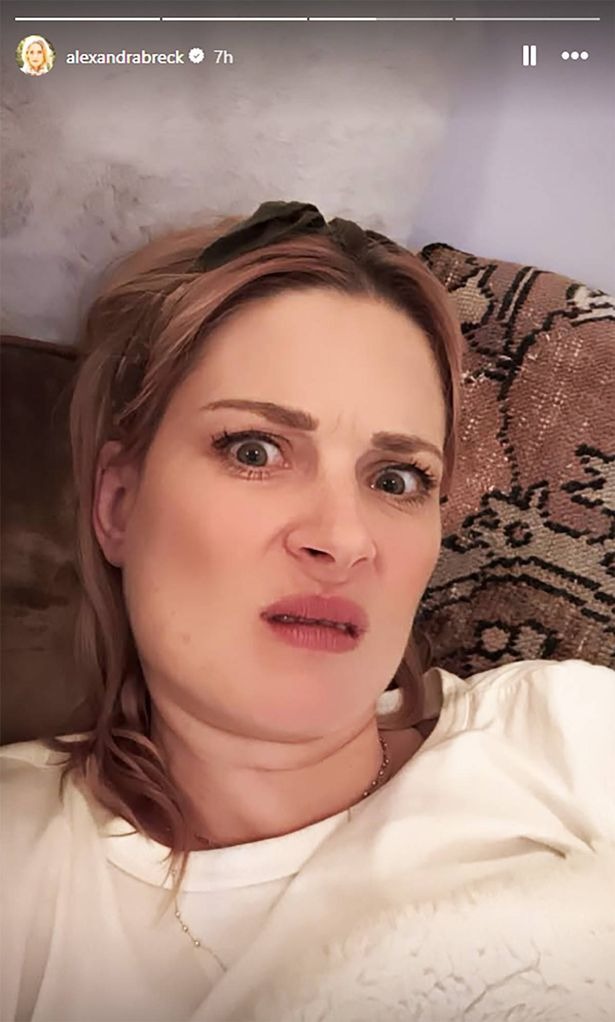
Introduction
“Virgin River” might look like the picture-perfect small-town drama on Netflix, but real-life reactions from its stars show there’s a darker undercurrent—especially when fans take things too far. Recently, Alexandra Breckenridge, who plays the show’s beloved lead, Mel Monroe, issued a blunt warning that took fans by surprise. And her reason? She was completely baffled by what some viewers had done.
So, what happened? Why did Breckenridge speak out, and what does it say about modern fandom?
Let’s break it all down.
Who Is Alexandra Breckenridge?
Before we dive into the drama, it helps to know who we’re talking about.
Alexandra Breckenridge isn’t new to the screen. While most know her as the emotionally complex nurse practitioner in “Virgin River,” she’s also starred in shows like “This Is Us,” “American Horror Story,” and even lent her voice to “Family Guy.” She’s a versatile talent with a reputation for keeping things low-key off-camera.
But lately, her tone has shifted.
Virgin River: A Netflix Sensation
Netflix struck gold with “Virgin River,” a gentle, feel-good drama set in a sleepy mountain town. Its charm lies in its simplicity—love stories, medical emergencies, and a close-knit community.
Breckenridge plays Mel Monroe, a woman trying to rebuild her life in the quiet town of Virgin River. The show’s success hinges largely on her grounded, empathetic performance.
Which is why fans were shocked when she stepped forward with a sharp warning.
What Triggered Alexandra Breckenridge’s Warning?
So what exactly pushed Alexandra to speak out?
It wasn’t a scandal. It wasn’t a feud. It was fans.
Specifically, some fans began criticizing the show’s direction and even Breckenridge’s performance in ways that crossed the line from critique into personal attacks.
During a recent interview, she revealed her frustration with how certain fans were acting entitled—as if they owned the storyline or her character.
The Incident That Left Her ‘Baffled’
According to Breckenridge, what baffled her most wasn’t criticism—it was how certain fans demanded plot changes or sent her angry messages blaming her for things her character did.
Think about that: getting hate mail for something a fictional person does.
She described being “baffled” that people couldn’t separate the actress from the role. It wasn’t just occasional confusion—it was an aggressive expectation that she, Alexandra, had control over every plot twist.
Spoiler alert: she doesn’t.
When Fandom Crosses the Line
It’s one thing to be a passionate fan—it’s another to send nasty messages over a story arc.
Breckenridge’s response wasn’t just frustration. It was a stern warning: “Just because you watch the show doesn’t mean you get to direct it.”
She’s not wrong. Too often, intense fanbases blur the line between loving a show and trying to control it. And stars bear the brunt of that confusion.
Social Media and Its Double-Edged Sword
Social media has changed how celebrities and fans connect. In some ways, it’s amazing. Fans feel closer than ever to their favorite stars.
But that closeness can turn toxic fast.
Breckenridge talked about how platforms like Instagram make it easy for fans to direct their frustration straight at her inbox. DMs that should be praise or curiosity instead become a platform for complaints and entitlement.
The Celebrity-Fan Boundary
Here’s where things get real. Just because someone’s on your screen doesn’t mean they owe you explanations or emotional labor.
Breckenridge reminded fans that actors are professionals—not emotional punching bags. They’re hired to portray characters, not to rewrite scripts or justify plot developments.

Why Stars Are Speaking Up More Than Ever
Alexandra’s warning isn’t an isolated moment. More and more celebrities are speaking up.
From Millie Bobby Brown’s decision to step back from fan interactions to Selena Gomez addressing trolls about her body, stars are reclaiming their peace.
Breckenridge joining that chorus shows this isn’t about fame—it’s about boundaries.
How Alexandra Breckenridge’s Message Resonates
The message hit home for many. Plenty of fans rushed to her defense, expressing sympathy and support.
It also sparked wider conversations about respecting artists, especially in emotionally driven shows like “Virgin River.”
Yes, you can be passionate. But don’t forget they’re real people.
Support From Her Co-Stars
After her message went public, several of Breckenridge’s co-stars stood by her side.
Tim Matheson (Doc Mullins) and Martin Henderson (Jack) both hinted in interviews that fan reactions have gotten “out of hand” at times. They praised Alexandra for speaking up and encouraged others to remember there’s a team behind every scene.
The Role of Misinterpretation in Online Culture
Part of the problem? Misinterpretation.
When you post online, tone disappears. A joke can sound like a jab. A plot guess can feel like an attack.
Breckenridge’s team clarified that she loves her fans—but she won’t tolerate being harassed over fictional drama.
Fair, right?
Behind-the-Scenes Pressure of “Virgin River”
“Virgin River” isn’t filmed in a real small town with real-time reactions. It’s a carefully constructed world—one that takes months of preparation, coordination, and emotional energy.
Breckenridge noted that critics often forget how much effort goes into crafting one episode.
So when angry fans throw stones, it’s not just hurtful—it’s wildly unfair.
Is Virgin River’s Fame Becoming Too Much?
It’s a fair question. Has the show become so popular that it’s lost its calm?
The more exposure a show gets, the more voices it attracts. And while some fans are thoughtful, others bring chaos.
Breckenridge’s baffled reaction may be the first of many if the tone doesn’t shift.
Fans React: Mixed Emotions Online
Naturally, the internet had thoughts.
Some users defended their right to criticize: “If we’re watching, we get to comment.” Others reminded them, “There’s a difference between feedback and bullying.”
One user summed it up best: “You can love the story without attacking the storyteller.”
What This Says About Celebrity Culture Today
We’re at a crossroads in fandom.
On one side, you have admiration and connection. On the other, entitlement and toxicity.
Breckenridge’s experience highlights the need for boundaries and understanding in the way we interact with celebrities.
A Call for Respect and Perspective
At the end of the day, Alexandra Breckenridge isn’t asking for silence—just respect.
She’s saying: enjoy the show. Engage with the story. But don’t forget the people behind the scenes.
Because when passion turns personal, everyone loses.
How Alexandra’s Warning Could Shift Future Interactions
Will fans learn from this? Possibly.
More stars are speaking up. More conversations are happening. And more people are realizing that being a fan doesn’t mean being in control.
This could be a turning point—for “Virgin River” and for entertainment culture at large.
Conclusion
Alexandra Breckenridge’s warning wasn’t just a celebrity venting—it was a wake-up call. She reminded fans that while they may feel connected to characters, they don’t own them. And the people playing them? They’re just doing their jobs, often under pressure and scrutiny we’ll never see.
So next time you want to DM your favorite star, maybe pause. Ask yourself: Am I adding kindness or chaos?
Let’s all take a breath, enjoy the story, and leave the writing to the writers.
FAQs
1. What did Alexandra Breckenridge say to Virgin River fans?
She issued a warning against entitled and aggressive fan behavior, expressing confusion over fans who mistake her for her character and expect her to change the storyline.
2. Why was she ‘baffled’?
She was baffled by the intensity and anger of some fan messages, especially those blaming her personally for the actions of her fictional character.
3. Did her co-stars support her message?
Yes. Several co-stars, including Martin Henderson and Tim Matheson, have spoken up in support of her stance on maintaining respectful fan interactions.
4. Has this kind of fan behavior happened in other fandoms?
Absolutely. Many celebrities, from Stranger Things to Marvel actors, have shared similar experiences with intense or toxic fan reactions.
5. What can fans do to support their favorite stars better?
Engage with positivity, avoid personal attacks, separate actors from characters, and always remember there are real people behind the screen.